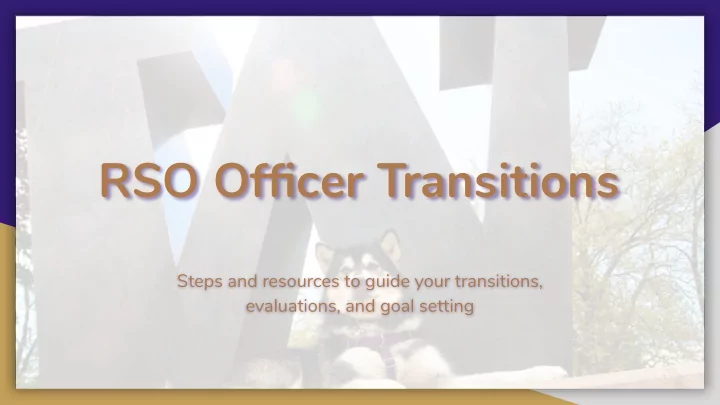

RSO Officer Transitions Steps and resources to guide your transitions, evaluations, and goal setting
What is an Officer Transition? Why do we need them? Transitions help prepare new officers for term while ● minimizing confusion. They ensure success and growth of organization. ● It can be a structured reflection for old officers, goal ● setting for new officers. They also help with the facilitation of exchange of ● information.
How to do your officer transition! Retreat : Full day training session ● Topics of conversation may include: history of your organization, mission and values, officer introductions, ice breakers, one-on-one facilitated officer meeting time, group conversation on suggestions or tips, etc. Training Meeting : Half day ● Use the online transition guide as a large part of your group meeting time and select any other topics that should be covered for all of your officers’ benefit. One-on-one Meetings : About one hour ● Incoming and outgoing (if available) officers will meet individually and utilize our online guide in order to facilitate their transition.
What is important for an incoming officer to know? This can be unique and different for every officer ● and organization. What resources should a new officer know ● about? What processes should a new officer be trained ● on? Consider the specifics for each position along ● with information about the organization that all officers must know.
Potential documentation to share/obtain The following should be covered in depth between incoming and outgoing officers, or examined carefully in the case there is no outgoing officer: Constitution ❏ Mission and goals of organization ❏ Member contact list ❏ Other important contacts ❏ Annual procedures/events ❏ Minutes from meetings ❏ Email information & Community login ❏ Social media login information ❏ Registration information ❏ Financial records ❏ Bank account information ❏ Historical documents ❏ Information on RSO Resource Center ❏ Calendar ❏ Any other specific information pertinent to your RSO ❏
Google Drive Transitions Many RSOs are using Google Drive to assist with ● their transitions. This is a good way to bring all documentation into ● one place to share with officers. Don’t just share the Google Drive, go over each ● item with the incoming officer and why it is important. Make sure to keep the Drive organized to make ● things easier to find!
Things to discuss or consider on your own while transitioning: Goals ● Programming ● Recruitment ● Events ● Membership ● Officers ● Marketing ● Funding ● Connection with SAO and other advisors ●
Goal Setting a. Begin by reviewing and evaluating last year’s goals. b. Which goals were attained? Which were not? Why? c. How can these goals be adjusted for this year? d. What new goals do you have? (SMART goal)* Goal topics may include: programming, recruitment, marketing, events, membership, officer roles, funding, etc.
SMART Goal S pecific (Who? What? When? Where? Why?) ● M easurable (How much? How will you know this goal has been met?) ● A chievable (How realistic is your goal? Do you have the necessary resources?) ● R elevant (Does it align with your goals? Is it important at this time?) ● T ime-based (How long will it take? What can you do today? What can you do in 2 weeks?) ● Example : An organization wants to improve recruitment efforts in order to gain more members. S pecific: Our organization will hold 3 recruitment socials on 5/3, 5/20, and 6/1 at 6:00 pm. These ● events will include introductions, food, socializing, etc., and will be advertised through social media, flyers, and word of mouth. We will also be advertising our general meetings as open to all, etc... M easurable: We will know our organization has met this goal when we gain 10 new members. ● A chievable: We have resources available (flyers, events, funding) that allow us to reach this. ● R elevant: We are seeking members who are passionate about our mission to help us grow this year. ● T ime based: We plan to achieve this goal in 4-6 weeks. Week 1 we will… (set timeline). ●
Next Steps: If you are an outgoing officer... If you are an incoming officer… What challenges did you face during What are your goals when entering this ● ● position? your term? How did they help make you a better leader? How do you hope to grow as both a ● leader and individual? How will you utilize the skills you have ● learned through this position in your What obstacles do you imagine facing, ● how do you plan to overcome these? future? What resources do you have available to ● What insights or suggestions would you ● assist you in your journey? offer your incoming officer?
As an RSO... Required Actions Attend re-registration session Autumn ● Quarter, follow subsequent steps Switch officer names on RSO Community by ● emailing sao@uw.edu or visiting the office in person (HUB 232) Recommended Actions Apply for funding through SAO in Autumn ● Quarter Update Constitution ● Utilize RSO Resource Center ●
Takeaways Continue the conversation ● between officers. Remember that each ● organization and position are unique and different. Utilize the online RSO Officer ● Transition Guide and PowerPoint. Ask your SAO advisor for ● more guidance.
Questions? Created by Gabrielle Hickok Revised by Yurguen Gonzalez
Recommend
More recommend